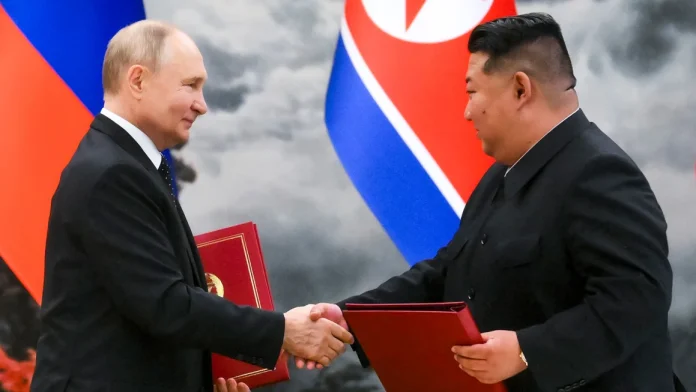North Korea and Russia have agreed to provide immediate military assistance in the event of an attack on either country, according to a new defense pact signed by their leaders. Russian President Vladimir Putin and North Korean leader Kim Jong Un signed this strategic partnership agreement during Putin’s rare state visit to Pyongyang, describing it as a significant milestone in bilateral relations akin to their Cold War-era mutual defense pledge of 1961. This agreement, amidst Putin’s ongoing conflict in Ukraine, strengthens North Korea’s ties with a major world power that holds veto power at the UN Security Council.
The full text of the pact, published by North Korean state media KCNA, outlines cooperation in political, trade, investment, and security realms. Notably, Article 4 commits both nations to provide military and other assistance immediately should either face armed aggression.
After their meeting, Putin emphasized the pact’s defense clause, highlighting mutual assistance in case of aggression against either party. Kim hailed the agreement as a pivotal moment in bilateral relations, though analysts view it more as a formal defense treaty than a partnership agreement.
The pact’s “automatic intervention clause” mandates mobilization of military assets, including army, navy, and air force, in response to aggression. Details on specific military intervention provisions remain limited, prompting calls for close monitoring of North Korea and Russia’s military activities.
This agreement underscores their alignment amid international isolation over Moscow’s Ukraine conflict and Pyongyang’s nuclear ambitions. Accusations abound regarding North Korea’s significant military aid to Russia during its war efforts, raising concerns over potential breaches of international sanctions and support for Pyongyang’s military satellite program.
Putin’s remarks post-meeting criticized U.S. “imperialist policy” and left open the possibility of military-technical cooperation with North Korea, potentially enhancing its nuclear capabilities.
Analysts warn such technological collaboration could bolster North Korea’s military strength, a move seen as Russia prioritizing Pyongyang over global nonproliferation norms and its UN Security Council obligations.























